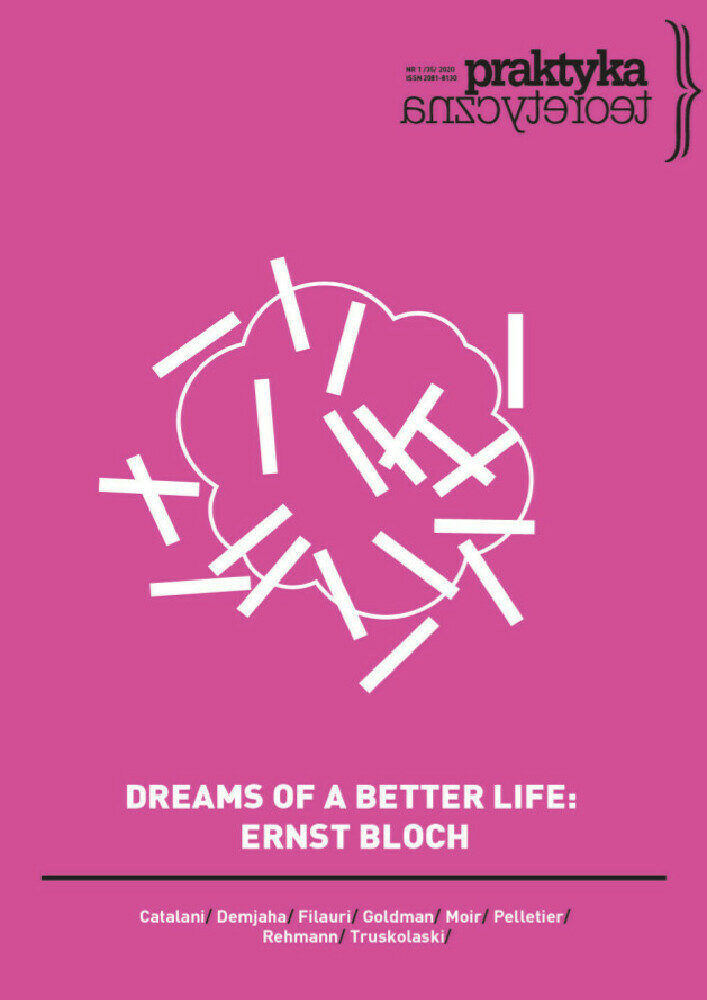Abstract
This article describes the origin of Bloch’s moral theory, which was formulated partly as a response to Simmel’s moral relativism. It also shows that Bloch’s theory is a coherent example of what Charles Taylor calls “expressivism,” a contemporary philosophical attitude which emphasizes the creation of values, with its transgressive character. Finally, the article addresses some shortcomings of Bloch’s expressivist moral theory, and emphasizes the necessity this author felt to complete it with norms ensuring human dignity.
References
Bloch, Ernst. 1918. Geist der Utopie. Faksimile der Ausgabe von 1918. Frankfurt-am-Main: Suhrkamp (reprint of 1971).
Bloch, Ernst. 1923. Durch die Wüste. Kritische Essays. Berlin: Paul Cassirer.
Bloch, Ernst. 1962a. Thomas Münzer als Theologe der Revolution. Frankfurt am Main: Suhrkamp (original edition in 1921).
Bloch, Ernst. 1962b. Subjekt-Objekt. Erläuterungen zu Hegel. Frankfurt am Mein: Suhrkamp.
Bloch, Ernst. 1969. Philosophische Aufsätze zur objektiven Phantasie. Frankfurt am Main: Suhrkamp.
Bloch, Ernst. 1972. Vom Hasard zur Katastrophe. Politische Aufsätze 1934-1939. Frankfurt am Main: Suhrkamp.
Bloch, Ernst. 1975. Experimentum mundi. Frage, Kategorien des Herausbringens, Praxis. Frankfurt am Main: Suhrkamp.
Bloch, Ernst. 1983. “Über das Problem Nietzsches.” Bloch-Almanach 3: 76–80 (original edition in 1906).
Bloch, Ernst. 1985. Kampf, nicht Krieg. Politische Schriften 1917-1919. Frankfurt am Main: Suhrkamp.
Bloch, Ernst. 1986. Natural Right and Human Dignity. Translated by Dennis J. Schmidt. Cambridge, MA: MIT Press (original German edition in 1961).
Bloch, Ernst. 1991. The Heritage of our Times. Translated by Neville and Stephen Plaice. Cambridge (UK): Polity (original German edition in 1934).
Bloch, Ernst. 1992. “Gedanken über religiöse Dingen.” Bloch-Almanach 12: 9–13 (original edition in 1905).
Bloch, Ernst. 1995. The Principle of Hope. 3 vol. Translated by Stephen Plaice, Paul Knight and Neville Plaice Cambridge, MA: MIT Press (original German edition in 1954–1955).
Bloch, Ernst. 2000. The Spirit of Utopia. Translated by Anthony A. Nassar.: Stanford University Press.
Bloch, Ernst. 2010. Études critiques sur Rickert et le problème de la théorie moderne de la connaissance. Québec: Presses de l’Université Laval/Paris: Éditions de la Maison des sciences de l’homme.
Frings, Manfred. 2001. The Mind of Max Scheler. Milwaukee: Marquette University Press.
Hartmann, Eduard von. 1876. “Das philosophische Dreigestirn des 19. Jahrhunderts. Eine kritische Einleitung in die Philosophie des Unbewussten.” In Studien und Aufsätze gemeinverständlichen Inhalts, 547–729. Berlin: Duncker.
Hegel, G.W.F. 1984. The Letters. Translated by Clark Butler and Christiane Seiler. Bloomington: Indiana University Press.
Kant, Immanuel. 1917. Perpetual Peace: A Philosophical Essay. Translated by Mary C. Smith. London: Allen & Unwin.
Löwenthal, Leo and Siegfried Kracauer. 2003. In steter Freundschaft. Briefwechsel 1921-1966. Springe: zu Klampen.
Marx, Karl. 1967. Writings of the Young Marx on Philosophy and Society. Indianapolis: Hackett.
Negt, Oskar. 1972. “Ernst Bloch – der deutsche Philosoph der Oktoberrevolution. Ein politisches Nachwort.” In Ernst Bloch. Vom Hasard zur Katastrophe. Politische Aufsätze 1934-1939, 429–444. Frankfurt am Main: Suhrkamp.
Pelletier, Lucien. 2009. “Ernst Bloch à la rencontre de la phénoménologie.”Bloch-Almanach 28: 201–276.
Pelletier, Lucien. 2010. “L’influence d’Emil Lask sur le jeune Ernst Bloch.” Revue philosophique de Louvain 110(1): 23–49.
Pelletier, Lucien. 2015. “La formation de la philosophie d’Ernst Bloch à partir de la mystique de Maître Eckhart.” Laval théologique et philosophique 71(1): 97–132.
Simmel, Georg. 1995a. Gesamtausgabe, vol. 7: Aufsätze und Abhandlungen 1901-1908, vol. I. Frankfurt am Main: Suhrkamp.
Simmel, Georg. 1995b. Gesamtausgabe, vol. 10: Philosophie der Mode. Die Religion. Kant und Goethe. Schopenhauer und Nietzsche. Frankfurt am Main: Suhrkamp.
Simmel, Georg. 1997. Gesamtausgabe, vol. 9: Kant. Die Probleme der Geschichtsphilosophie. Frankfurt am Main: Suhrkamp.
Simmel, Georg. 2000. Gesamtausgabe, vol 1: Das Wesen der Materie nach Kant’s Physischer Monadologie. Abhandlungen 1882-1884. Rezensionen 1883-1901. Frankfurt am Main: Suhrkamp.
Simmel, Georg. 2004. The Philosophy of Money. Translated by Tom Bottomore and David Frisby. London and New York: Routledge.
Taylor, Charles. 1985. Philosophical Papers, vol. 2: Philosophy and the Human Sciences. Cambridge et al.: Cambridge University Press.
Taylor, Charles. 1989. Sources of the Self: The Making of the Modern Identity. Cambridge (MA): Harvard University Press.
Taylor, Charles. 2011. Dilemmas and Connections: Selected Essays. Cambridge (MA)/London : Belknap.
Taylor, Charles. 2016. The Language Animal: The Full Shape of the Human Linguistic Capacity. Cambridge (MA)/London: Belknap.
License
“Theoretical Practice” seeks to put into practice the idea of open access to knowledge and broadening the domain of the commons. It serves the development of science, thinking and critical reflection. The journal is published in open-access mode under the CC-BY-NC-SA 4.0 license (detail available here: http://creativecommons.org/licenses/by-nc-sa/4.0/). Articles published in the journal may be freely distributed, stored, printed and utilized for academic and teaching purposes without restrictions.
They should not be, however, used for any commercial purposes or be reconstructed into derivative creations. Access to the journal may not be limited or offered for a fee by any third party.
Prospective authors are obliged to fill in, sign and send back the publishing contract compliant with the CC licencing. [PL.pdf, PL.doc, EN.pdf,EN.doc].
According to this contract, authors grant the journal a non-exclusive right to publish their work under the creative commons license (CC-BY-NC-SA 4.0) without any financial obligation on both sides of the contract.
Before submission authors should make sure that derivative materials they use are not protected by copyright preventing their non-commercial publication. Authors are responsible for any respective copyright violations.
